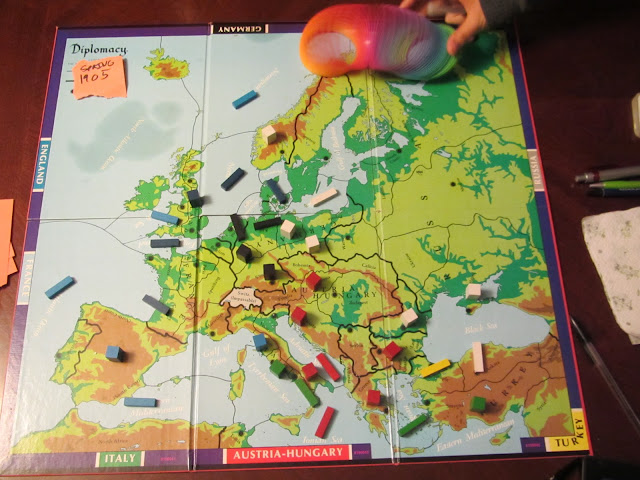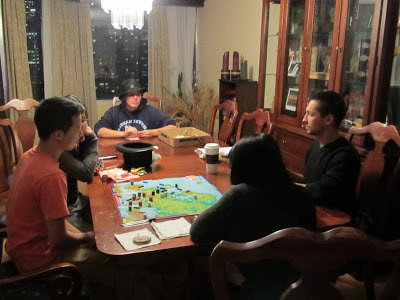de Oorlog tot de Beschaving
vol. 3 (1903)
Minor skirmishes turn into full-blown battles as Europe totters closer and closer to the edge of disaster. Bombs fall, soldiers gird their bayonets, and intelligence networks spend sleepless nights poring over incomprehensible reports from the front.
Big things are just over the horizon.
The Invasion of Turkey
In the East, Italy's concerted push towards Turkey turns into a full-blown invasion. In the Spring, Italian fleets sink the Turkish ships in the Aegean, and in the Fall Italian divisions march into Smyrna. The first major invasion of this war is under foot.
In reaction, Austria moves into Bulgaria, and Russia claims Ankara.
This is a dramatic turn of events: Turkey loses three units in one blow. Never has a nation been massacred thus. These events are sobering: how can any nation not look at Turkey's fate and ponder her own fragile mortality?
Who will Turkey turn to now, to hold on to her last shred of territory? Constantinople, her last bastion, is surrounded and besieged on all sides.
Russia continues to play a minor role in this conflict, but moves rather more confidently in the North, reacting to Germany's invasion of Prussia in 1902 (and the breaking of their 1901 pact) by forcing Germany out of the Baltic for good.
It is not clear, however, what the goal of this conflict may be. Neither Russia nor Germany has much to gain from a war on this front. Historically, both Russia and Germany have more to lose than to gain from such a continental war. Nevertheless, these two powers will find it difficult to disengage peacefully.
Austria continues to benefit the most from the current situation. Russia is a distant threat at most; Turkey toothless for the moment. Italy, her traditional biggest threat, lies almost completely exposed, the King's forces committed to the Turkish war. Germany is safely at arm's-length. In 1904, no one can hurt Austria.
With her sixth build, Austria threatens to expand her zone of influence to the naval theatre, and cements her hold on her territory. An Austria at six units and control of the Adriatic can turn into an unstoppable force, as we have seen in two out of the three last Great Wars. Further growth for this powerhouse Empire appears to be in the cards.
Italy's situation, however, is probably the most interesting. The King has access to many different possibilities in 1903, and his choices will be illuminating.
With his three units in place against Turkey, he is likely to continue to make gains in the Anatolian peninsula. However, he will need to enter careful negotiations with his neighbours if he wishes to make those gains permanent.
The smartest ploy in his toolkit would be to offer Ankara to Turkey. By supporting the Turkish fleet into Ankara, he could move the fleet out of its central position (Constantinople). This would accomplish several aims at once:
- anger Russia,
- further reduce Turkish influence on what happens next,
- remove any kind of threat to his army in Smyrna, and
- leave Constantinople for him to claim.
In this hypothetical scenario, the Italian fleets would then move Aegean to Constantinople and Eastern Med. to the Aegean. From this position, Italy could claim one more build. The Sultan would no longer be able to threaten Smyrna or the Mediterranean, his fleet safely trapped in Ankara. Furthermore, Italy could then move to crush Ankara at his leisure, as well as make supported attacks on Bulgaria from the Aegean.
However, the King needs to be mindful of his relationship to Austria, lest he lose control of the Mediterranean (his metaphorical backyard) to the Empress for good. His fleets still outnumber hers. For now.
The Western Triangle
In the West, the situation develops more slowly. France, once seen as the dominant Western power, has first shrunk (by ceding Belgium to Germany) and then wasted his initiative advantage against England by hesitating for several turns.
Now he has given up his position against England in favour of sending a fleet into the Northern waters of the Norwegian Sea. It is an axiom of Diplomacy that a lone unit cannot accomplish much. If he cannot find a way to put this fleet into a position where it can be supported by other fleets (whether his own, or an ally's), France will be effectively fighting this war a unit down.
However, France has also finally brought his Portuguese army back into the realm of relevance. Not immediately obvious, perhaps, but this army could be used to invade Belgium with great ease.
Germany, sitting on six Centres with only five units, quite predictably finds himself unable to hold on to his expansive territory. Not an unexpected loss for Germany: it is typical in Diplomacy that when a country overreaches her grasp, a year or two of contraction follows.
A very clever maneuver -- an attempted convoy to Denmark -- would have allowed Germany to hold Denmark, the Baltic, and make supported attacks on the English position in Sweden (or convoy across the North Sea into England). Unfortunately for the Kaiser, the attempted convoy was prevented by combined Russian-English forces.
Losing Denmark to England, Germany is now back to five units.
England, at six units, is now the rising power in the West. Her position in the Nordic area is impregnable due to Russian cooperation, and France has almost entirely maneuvered out of her threat zone.
If England is going to reverse the balance of power and seize the offensive, 1904 will be the year where the Queen shifts gears from the defensive to take a dominant position vis-a-vis her two other Western neighbours.
She has some very interesting offensive options against France due to her fleet build in Liverpool, or can put a lot of pressure on Germany by claiming the North Sea.
An aside:
Ah, the North Sea!
The treasure of the Calhamer map.
There are a handful of territories on the map which border four Supply Centres, and a single territory which borders five. The North Sea, however, has the truly unique characteristic of given its proprietor access to no fewer than six Supply Centres:
- Norway (English)
- Denmark (English)
- Edinburgh (English)
- London (English)
- Holland (German)
- Belgium (French)
It is this unique characteristic which makes the North Sea the single most valuable territory on the Calhamer map.
Holding it is absolutely key for England, Germany, and France. In 1903, the North Sea was hotly contested, with English forces bouncing out a combined Franco-German assault.
It seems this year even more clever designs on the North Sea may be brewing. Who will seize the upper hand in the Western Triangle?





















